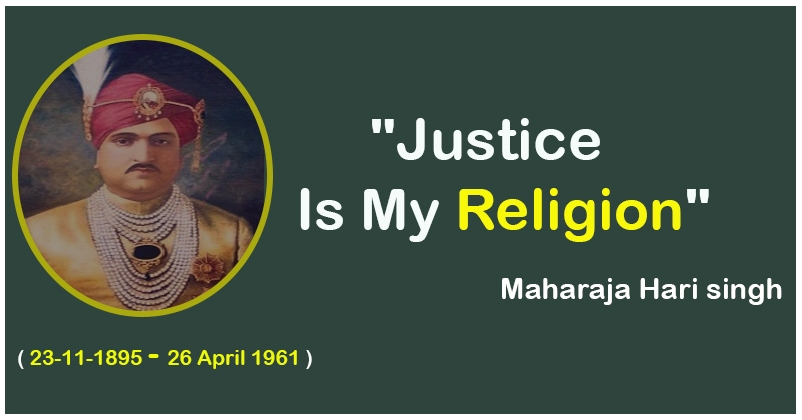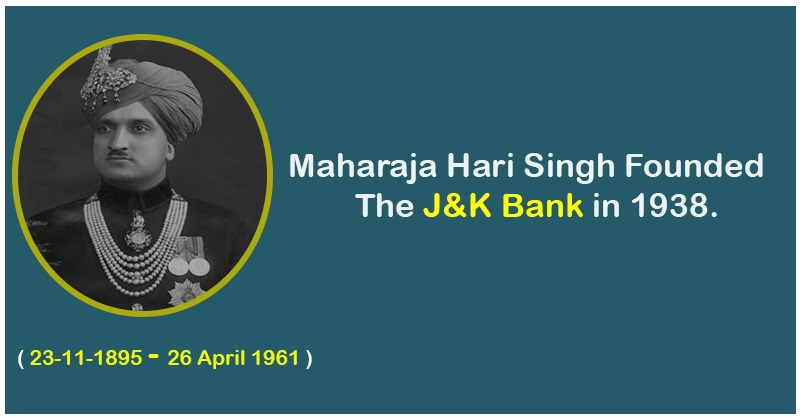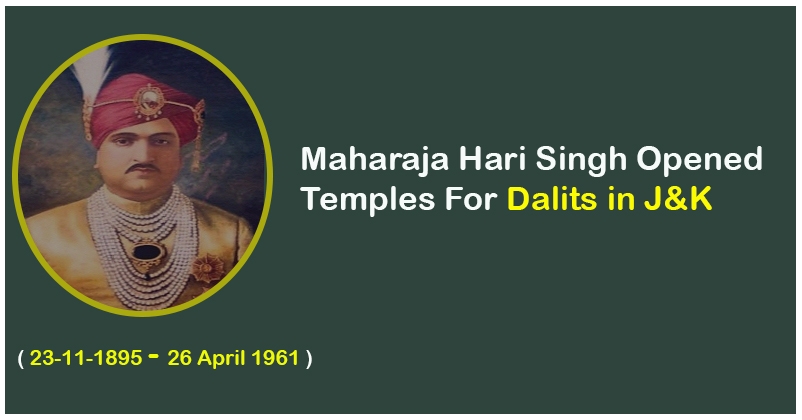
Maharaja Hari Singh was born on September 23, 1895. He was the last ruling Maharaja of the princely state of Jammu and Kashmir (J&K). Apart from his development and people centric work Maharaja’s biggest contribution was to accede the state of Jammu and Kashmir to India. Though he has the option of choosing either from India or Pakistan, he opted for India. His developmental work like opening of J&K Bank, promotion of democracy etc. are examples of his great contribution for wellbeing of J&K. He breathed his last on 26 April, 1961 in Mumbai. No ruler of the bygone era draws as much respect and love as Maharaja Hari Singh.
Some of the important contributions of Maharaja Hari Singh:
· He introduced Agriculturist’s Relief Act to settle the debtor and creditor disputes through court. Thus, the peasants and rural workers were saved from the egocentricity of money lenders and creditors. The Land Alienation Act ensured that agricultural land must not be transferred to a non-agriculturist. Agriculturists were granted proprietary ownership rights and were relieved from the taxes or levies of Nazrana and Malikana. The Kahcharai Act granted exemption to the owners of livestock in respect of particular animals of a given number and age. The bulls to of highest breed were distributed among the peasants in selected places. Begar and forced labour was completely banned under his . rule
· On the rural development front Maharaja Hari Singh empowered village panchayats to resolve community conflicts in at the village level and the Panchayats were involved in the implementation of rural development plans. He established Department of Rural Development as early as 1937.
· As a progressive step for economic development Maharaj Hari Singh focused on trade and industries and abolished numerous taxes, besides this local products and local purchases were encouraged. Manufacturing units of matchboxes, tents, carpets, woodworks, crafts, tannery goods, silk yarn, food etc. were set up during his regime. He established “The Jammu and Kashmir Bank” in 1938 that took care of the government treasury. This push to industry, trade and local business resulted in generating employment and improved the social indexes. The state Government established small silk factory in Jammu, with its production unit in Srinagar, where apart from employment to the people, additional revenue was also generated for thousands of rural families who raisin cocoons????. In 1941, industrial centers and emporiums were opened in Srinagar and later in Jammu, this gave impetus to the trade of Kashmiri products. He even promoted tourism in J&K.

Various schemes were launched for beautification of Srinagar and also to develop Pahalgam and Gulmarg as ideal hill stations.
· During World War-II, he ensured supply of grains like wheat and rice at controlled price in state. A special Price Control Department was also set up for this purpose. He established a fund to alleviate the condition of the poor population.
· Maharaja initiated modern communication services of telegraph, telephone, and wireless in major towns and cities of the state. He even constituted ‘Flood Control Department’.
· He decreed to provide free education at primary and secondary level for his state subjects in 1930 and made primary education compulsory for children. The Scholarship Selection Board was established and scholarships were granted to the deserving students for higher and technical education in India and abroad. Apart from establishing new schools, colleges and institutions, he introduced loan schemes for students. Urdu language was made the medium of instruction in schools but students had the option of choosing either the Devnagri or the Persian scripts.
· Maharaja addressed the problems of social evils like torturing and trafficking of women, child marriage,t practice of untouchability etc prevalent in the society. He constituted two committees, one in 1926 and the other in 1929 to prevent female infanticide. These committees recommended educating the people and pronouncing exemplary punishment for perpetrators. Maharaja accepted both the recommendations. He established ‘Dhandevi Memorial Fund’ for the marriage of girls. He worked on prevention of child smoking. He defined the marriageable age of children and the breach of the ordinance was made punishable with one year’s imprisonment or fine up to rupees one thousand or both. He was instrumental in curbing women and children trafficking and making the business of prostitution a punishable office. He even penalised encouraging or assisting in seduction or prostitution of minor girls. He opened all public schools, colleges, and wells to the untouchables in 1931 and all the state temples were also opened for them. In 1940, he proclaimed untouchability a crime. He removed legal disabilities on the marriages of Hindu widows.

· He replaced a totalitarian administration into more secular and non-communal practices.
· Since the early days of 1846 to 1889 the state government was run by Maharaja’s personal assignees and advisors headed by a Prime Minister. It was Maharajah Pratap Singh who shared his powers with the State Council in 1889, which was an effort to regulate the administration. Maharaja Hari Singh endorsed the formation of a Legislative Assembly called the Jammu and Kashmir Praja Sabha in 1934. The Praja Sabha which earlier was declared as recommendatory body,consisted of 75 members- 12 government officials, 16 state councilors, 14 nominated and 33 elected members. The last category consisted of 21 Muslims, 10 Hindus and 2 Sikhs. The Muslim Conference won 14 seats out of 21 reserved for the Muslim.